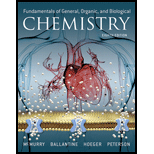
Fundamentals of General, Organic, and Biological Chemistry (8th Edition)
8th Edition
ISBN: 9780134015187
Author: John E. McMurry, David S. Ballantine, Carl A. Hoeger, Virginia E. Peterson
Publisher: PEARSON
expand_more
expand_more
format_list_bulleted
Question
Chapter 29, Problem 29.64GP
Interpretation Introduction
Interpretation:
The compounds which are expected to cross the BBB the easiest and the compounds which are expected to cross the BBB the hardest has to be given and also provide a chemical rationale for the answer.
Concept introduction:
Blood-brain barrier (BBB) is made up membrane lipids.
The breaching of BBB is depending upon the solubility of substances in the membrane.
Alcohols are very soluble in lipids.
Expert Solution & Answer
Want to see the full answer?
Check out a sample textbook solution
Students have asked these similar questions
Name at least two undesirable characteristics are often associated with alkaloids.
Give the pharmacological property of the following alkaloids. Where do they naturally occur?
morphine
quinine
berberine
What are the chemical tests used in identifying alkaloids?
Consider the decapeptide angiotensin I.a. What products are formed when angiotensin I is treated with trypsin?b. What products are formed when angiotensin I is treated with chymotrypsin?c. Treatment of angiotensin I with ACE (the angiotensin-converting enzyme) cleaves only the amide bond with the carbonyl group derived from phenylalanine to afford two products. The larger polypeptide is angiotensin II, a hormone that narrows blood vessels and increases blood pressure. Give the amino acid sequence of angiotensin II using three-letter abbreviations. ACE inhibitors are drugs that lower blood pressure by inhibiting the ACE enzyme
Chapter 29 Solutions
Fundamentals of General, Organic, and Biological Chemistry (8th Edition)
Ch. 29.1 - Prob. 29.1KCPCh. 29.3 - Prob. 29.1CIAPCh. 29.3 - Prob. 29.2CIAPCh. 29.3 - Prob. 29.3CIAPCh. 29.3 - Prob. 29.4CIAPCh. 29.3 - Match each term in the (a)(e) group with its...Ch. 29.5 - Prob. 29.3KCPCh. 29.5 - Prob. 29.4PCh. 29.5 - Prob. 29.5PCh. 29.8 - Prob. 29.5CIAP
Ch. 29.8 - Prob. 29.6CIAPCh. 29.8 - One of the more advanced blood tests used to...Ch. 29 - Body fluids occupy two different compartments,...Ch. 29 - Prob. 29.7UKCCh. 29 - Prob. 29.8UKCCh. 29 - Prob. 29.9UKCCh. 29 - Prob. 29.10UKCCh. 29 - Prob. 29.11UKCCh. 29 - Prob. 29.12UKCCh. 29 - Prob. 29.13APCh. 29 - Prob. 29.14APCh. 29 - Prob. 29.15APCh. 29 - Prob. 29.16APCh. 29 - Prob. 29.17APCh. 29 - Prob. 29.18APCh. 29 - Prob. 29.19APCh. 29 - Prob. 29.20APCh. 29 - Prob. 29.21APCh. 29 - Prob. 29.22APCh. 29 - Prob. 29.23APCh. 29 - What are the three main types of cells found in...Ch. 29 - Prob. 29.25APCh. 29 - Prob. 29.26APCh. 29 - Prob. 29.27APCh. 29 - Prob. 29.28APCh. 29 - Prob. 29.29APCh. 29 - Prob. 29.30APCh. 29 - Prob. 29.31APCh. 29 - Prob. 29.32APCh. 29 - Prob. 29.33APCh. 29 - Prob. 29.34APCh. 29 - Prob. 29.35APCh. 29 - Prob. 29.36APCh. 29 - Prob. 29.37APCh. 29 - Prob. 29.38APCh. 29 - Prob. 29.39APCh. 29 - Prob. 29.40APCh. 29 - Prob. 29.41APCh. 29 - Prob. 29.42APCh. 29 - What color is deoxyhemoglobin? Why?Ch. 29 - Prob. 29.44APCh. 29 - Prob. 29.45APCh. 29 - Prob. 29.46APCh. 29 - Prob. 29.47APCh. 29 - Prob. 29.48APCh. 29 - Prob. 29.49APCh. 29 - Prob. 29.50APCh. 29 - Prob. 29.51APCh. 29 - Prob. 29.52APCh. 29 - Prob. 29.53APCh. 29 - Prob. 29.54APCh. 29 - Prob. 29.55CPCh. 29 - Prob. 29.56CPCh. 29 - Prob. 29.57CPCh. 29 - How does active transport differ from osmosis?Ch. 29 - Prob. 29.59CPCh. 29 - Prob. 29.60CPCh. 29 - Prob. 29.61CPCh. 29 - Prob. 29.62CPCh. 29 - Have each member of your group choose an energy...Ch. 29 - Prob. 29.64GPCh. 29 - Prob. 29.65GP
Knowledge Booster
Similar questions
- List two classes of compounds derived from arachidonic acid. Suggest some reasons for the amount of biomedical research devoted to these compounds.arrow_forwardExplain how NH4+ can be toxic to cells. How is this toxicity avoided?arrow_forwardWhich of the followings statements is false considering the properties of alkaloids: Select one: a. Some alkaloids are colored, like berberine (orange) and sanguinarine (yellow) b. Caffeine, cocaine, codeine and nicotine are water soluble, whereas others, including morphine and yohimbine are highly water soluble c. Most alkaloids contain oxygen in their molecular structure; those compounds are usually colorless crystals at ambient conditions d. Many alkaloids dissolve poorly in water but readily dissolve in organic solvents, such as diethyl ether, chloroform or 1,2-dichloroethane e. Most alkaloids have a bitter taste or are poisonous when ingestedarrow_forward
arrow_back_ios
arrow_forward_ios
Recommended textbooks for you
